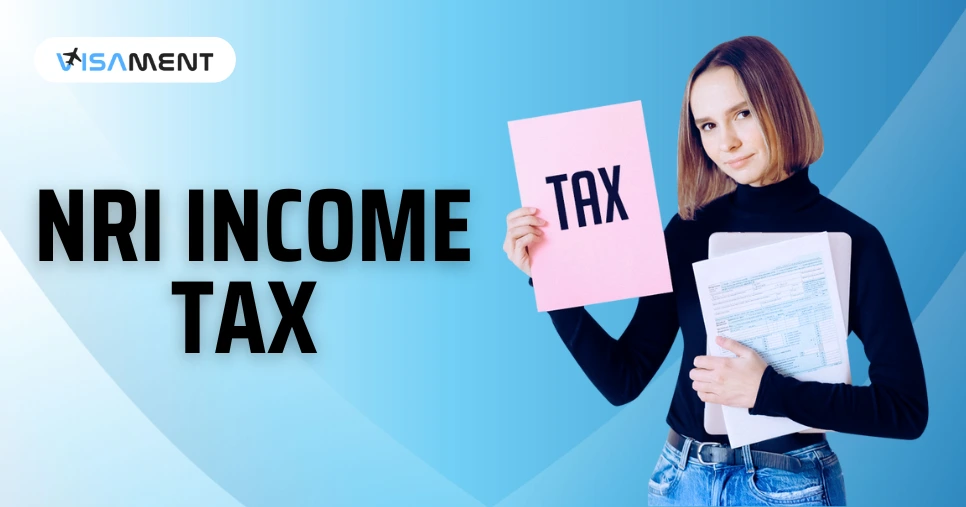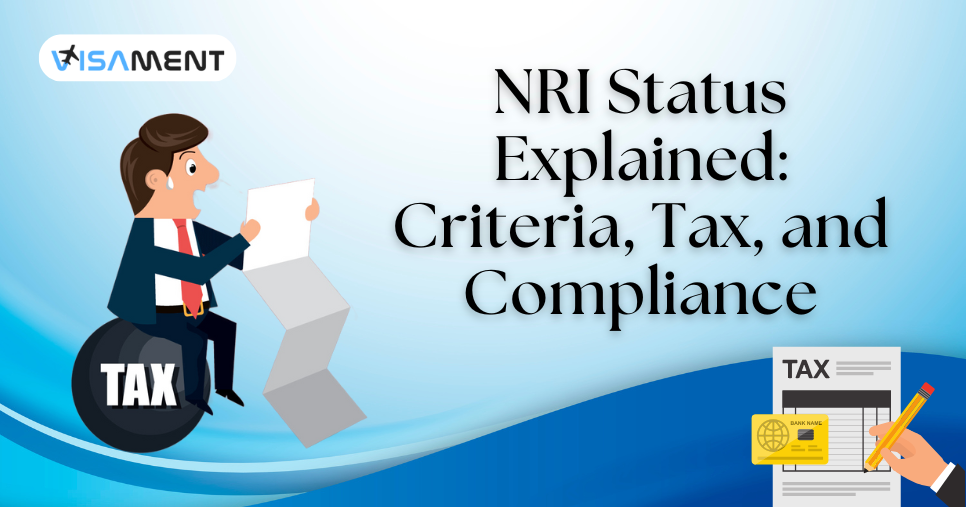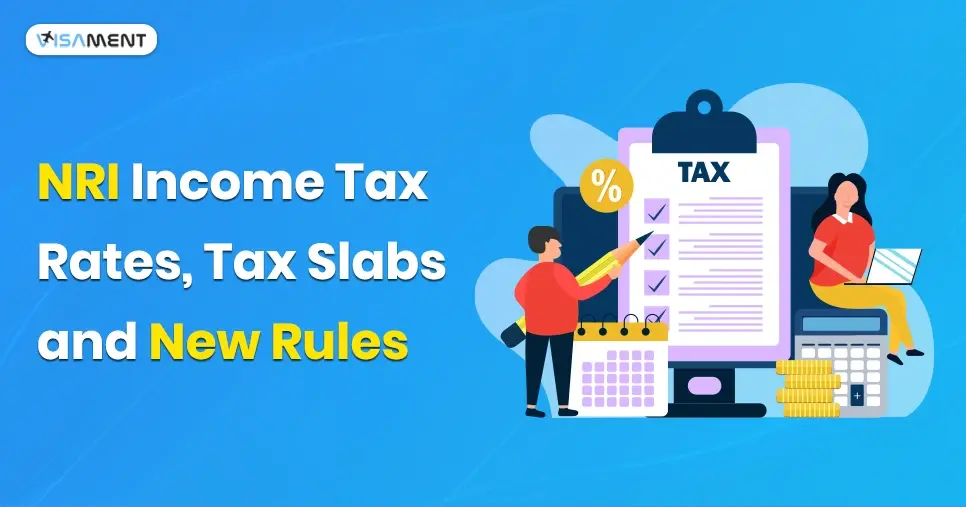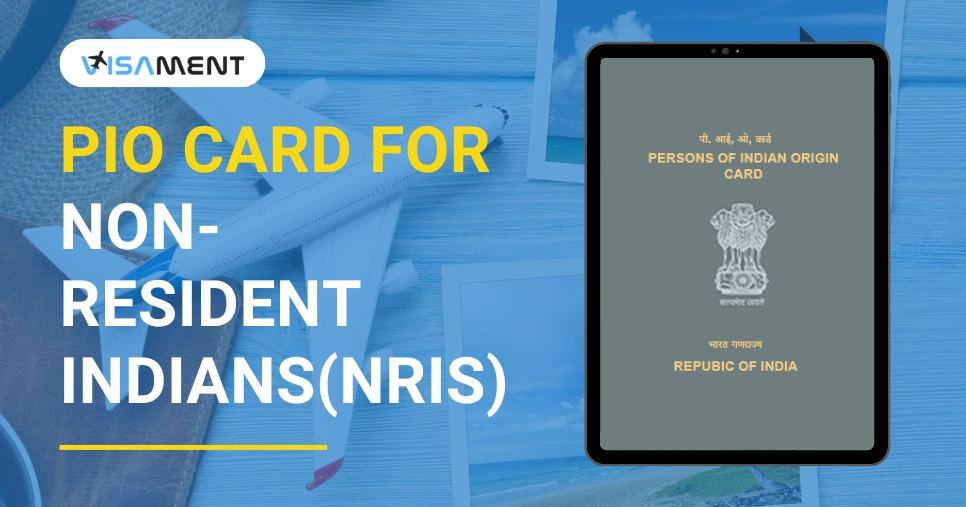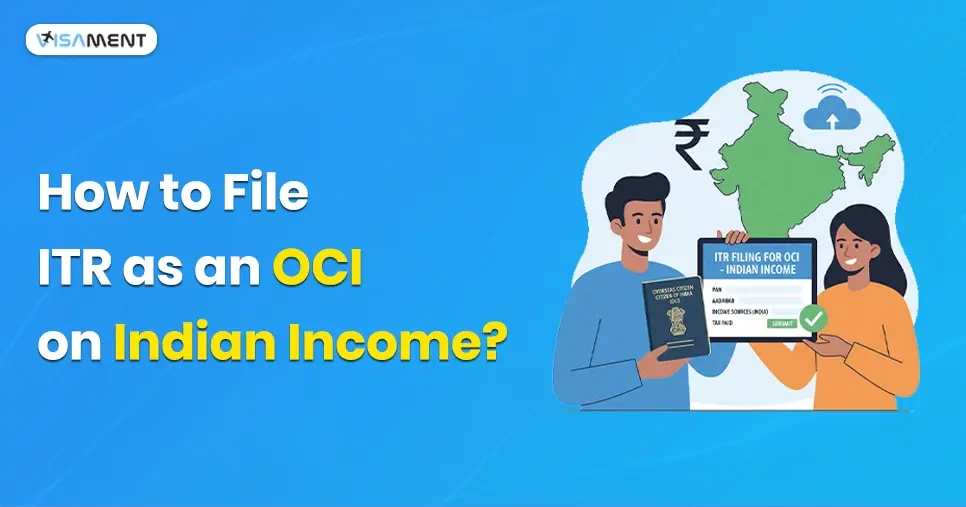- Key Takeaways
- Understanding NRI Income Tax in India
- Determining the Residential Status of an NRI
- Foreign Income of NRIs- Taxable or not
- Deductions and Exemptions for NRIs
- Deductions Not Available for NRIs
- When Should NRIs File ITR in India?
- Income Tax Slabs for NRIs
- Surcharge Rates for NRIs
- TDS on NRI’s Income
- ITR Forms for NRIs
- How can NRIs Avoid Double Taxation?
- Why Choose Visament?
Under the Income Tax Act, 1961, taxation in India has been regulated for both residents and NRIs. It makes the rules governing taxable income, residential status, and compliance requirements. The NRIs have to pay taxes on the income they have earned or received in India, such as rent, salary, capital gains, or NRO interest.
In this blog, we have provided details about NRI taxation in India, including taxes on foreign income of NRIs, deductions available to them, the ITR forms they need to fill out, and more.
Key Takeaways
- Taxable Income: Only Indian income is taxable in India; foreign income is not taxable in India.
- Deductions and Exemptions: NRIs can claim some deductions, like LTCG exemption up to INR 1.25 lakhs under section 80C.
- ITR Form: NRIs can file all other ITR forms except ITR-1 and ITR-4.
Understanding NRI Income Tax in India
NRI taxation in India does not apply to all of their income. The income tax rules only apply to the income that is received in India or arises in India. The interest from NRO accounts is taxable, and the interest from NRE and FCNR accounts is tax-free.
Taxable income includes the rent from Indian properties, salaries for services rendered in India, interest from Indian bank accounts, and capital gains from Indian assets.
Determining the Residential Status of an NRI
You should always check your residential status before knowing your tax liability. This status also helps you to know whether your global income is taxable in India or not.
If you satisfy the following situations, then you will be considered an Indian Resident:
- If you stayed in India for 182 days or more in an FY
- If you stayed for 60 days in the current year + 365 days in the past 4 years
The residential status for the individuals is further divided into:
- Resident-Ordinarily Resident (ROR)
- Resident but not Ordinarily Resident (RNOR)
Have questions? Our experts guide you through every step of the NRI Income Tax – no confusion, no delays.
Consult an Expert TodayForeign Income of NRIs- Taxable or not
The NRI Income Tax in India is totally dependent on his residential status for the year.
- If you are a resident, then your global income will be taxable in India.
- If you are an NRI, then income earned in India will only be taxable in India.
- If the Income earned by an NRI outside India is not taxable in India.
Here are the taxation rules for various types of income:
Salary Income
- If your services are rendered in India, then income from salary is considered to arise in India.
- The salary arising in India will be taxable whether you are a resident or not.
- Salary received in India is also taxable, no matter whether it arises.
Income from House Property
- The NRIs have to pay taxes on the Income from a property that is situated in India.
- The rules for the tax calculations and deductions are similar for residents and non-residents against house property income.
- It is taxed according to the income tax slab rates.
- The tenant should deduct the TDS on all the rent-related payments, no matter whether it is mentioned under the section 194-IB threshold limit or not.
- If the tenant is remitting the payment to the non-resident landlord, then he/she should submit Form 15CA and 15CB.
Income from Other Sources
The Interest Income from the savings accounts and fixed deposits held in Indian bank accounts is completely taxable in India. The interest on the FCNR and NRE accounts is tax-free, while the interest on the NRO accounts is taxable entirely.
Income from Business and Profession
If the income is earned by an NRI’s business controlled or set up in India, then it is taxable to them.
Income from Capital Gains
- If you have any capital gain on the transfer of a capital asset that is located in India, then it will be taxable for you.
- If a buyer purchases a property from an NRI, then he should deduct TDS at 12.5%.
- As per section 54, you can also claim the capital gains exemption by investing in a house property, and under section 54EC, you can also invest in capital gain bonds.
- If there are any capital gains on the investments in Indian securities and shares, then they will be taxable in India.
Say goodbye to paperwork stress! Hassle-free Income Tax Service for NRIs in the USA & UK.
Apply NowDeductions and Exemptions for NRIs
NRIs can also claim some deductions and exemptions from their taxable income, the same as residents. Here are those deductions:
Deductions under section 80C
- The deductions under section 80C are available to the NRIs. The maximum limit for the deduction is up to Rs 1.5 lakhs from the gross total income of the taxpayer.
Deductions from house property income for NRIs
NRIs are allowed to claim all the deductions that are available to a resident:
- 30% standard deduction on rent.
- Under section 24, there is an interest deduction on home loans.
- Deduction of principal repayment under section 80C.
- Some additional deductions under Section 80EE and Section 80EEA.
Deduction under section 80D
- NRIs can claim a deduction for the premium they have paid for health insurance.
- In case of spouse, dependent children, or self, the deduction is up to Rs 25,000.
- NRIs are allowed to claim a deduction of up to Rs 25,000 for parents’ insurance.
- If the insurance premium is for the resident senior citizens, then the limit is up to Rs 50,000.
Deduction under section 80E
- NRIs are allowed to claim a deduction of interest they have paid on education loans.
- Under this section, there is no limit on the amount for deduction.
- The deduction is available for 8 years or till the interest is paid completely, whichever is earlier.
- They cannot claim a deduction on the principal repayment of the loan.
Deduction under section 80G
- NRIs can claim a deduction for the donations they have made for social causes.
Deduction under section 80TTA
- Non-resident Indians can claim a deduction of a maximum of Rs 10,000 on the interest income from savings bank accounts.
- It applies to deposits in savings accounts in a bank, post office, or cooperative society.
Exemption on the sale of property for an NRI
- The LTCG is taxed at the rate of 12.5%. The TDS is also deducted at the same rate.
- On LTCG, NRIs can claim the exemptions under Section 54EC, Section 54, and Section 54F.
|
Exemption section |
Capital gains on |
Investment of Capital Gains in |
|---|---|---|
|
Section 54 |
Residential House Property |
Residential House Property |
|
Section 54EC |
Residential House Property |
Specified Bonds |
|
Section 54F |
Any capital asset |
Residential House Property |
Deductions Not Available for NRIs
The deductions that are not allowed to NRIs are given below under various sections:
Investments under section 80C
- The investments in PPF accounts are not allowed for NRIs. They cannot open the new PPF accounts. They are allowed to maintain those accounts that they have opened while being residents.
- Any Investments in National Savings Certificates (NSCs)
- Post office 5-year deposit scheme
- Senior Citizen Savings Scheme (SCSS)
Deduction for the differently-abled under section 80DD
It includes the deduction made for maintenance, which includes medical treatment of a handicapped (as defined in this section) dependent person. These types of deductions are not allowed for the NRIs.
Deduction for the differently-abled under section 80DDB
It includes the deduction made for the medical treatment of a disabled person (as certified by a specialist). This deduction is only for the residents.
Deduction for the differently-abled under section 80U
It includes the deduction for disability where the taxpayer himself is disabled (as defined under this section). These deductions are not for the NRIs.
When Should NRIs File ITR in India?
If the Income of the NRIs in India exceeds the basic exemption limit, then they must file the Income Tax Return. You can claim refunds for the TDS deducted on rent or interest if you file ITR, even if your income is below the limit.
- Exemption Limit (old regime): Rs 2.5 lakhs (Age less than 60 years)
- Exemption Limit (new regime) FY 2025-26: Rs 4 lakhs
- Due Date: 31st July 2026 (unless it's extended by the government)
Income Tax Slabs for NRIs
Here are the various Income tax slabs:
Income Tax Slabs for the old tax regime FY 2025-26
|
Income Tax Slab (INR) |
Income Tax Rate |
|---|---|
|
Up to 2,50,000 |
NIL |
|
2,50,001-5,00,000 |
5% above 2,50,000 |
|
5,00,001-10,00,000 |
12,500 + 20% above 5,00,000 |
|
Above 10,00,000 |
1,12,500 + 30% above 10,00,000 |
Income Tax Slabs for the new tax regime (default) FY 2025-26
|
Income Tax Slab (INR) |
Income Tax Rate |
|---|---|
|
Up to 4 lakhs |
NIL |
|
4 lakhs-8 lakhs |
5% |
|
8 lakhs-12 lakhs |
10% |
|
12 lakhs-16 lakhs |
15% |
|
16 lakhs-20 lakhs |
20% |
|
20 lakhs-24 lakhs |
25% |
|
Above 24 lakhs |
30% |
Income Tax Slabs for the new tax regime (default) FY 2024-25
|
Income Tax Slab (INR) |
Income Tax Rate |
|---|---|
|
Up to 3 lakhs |
NIL |
|
3 lakhs - 7 lakhs |
5% |
|
7 lakhs - 10 lakhs |
10% |
|
10 lakhs - 12 lakhs |
15% |
|
12 lakhs - 15 lakhs |
20% |
|
Above 15 lakhs |
30% |
Surcharge Rates for NRIs
The surcharge rates depend on the marginal relief, and they apply to the income of the NRIs as well as the Indian citizens. Under the new tax regime, the maximum surcharge shall be 25%.
|
Total Taxable Income |
Surcharge Rate of Income Tax |
|---|---|
|
Rs 50 lakhs - Rs 1 Crore |
10% |
|
Rs 1 Crore - Rs 2 Crore |
15% |
|
Rs 2 Crore - Rs 5 Crore |
25% |
|
Above Rs 5 Crore |
37% |
TDS on NRI’s Income
The NRIs cannot avoid Tax Deducted at Source (TDS) in many cases. The payer needs to deduct it before making the payment.
|
Type of Income |
TDS Rate |
|---|---|
|
Rent |
30% |
|
Property Sale |
12.5% |
|
NRO account interest |
30% |
|
Dividend |
20% |
ITR Forms for NRIs
Selecting the accurate ITR form is very important for compliance. The NRIs cannot file ITR 1 & 4. The appropriate ITR form can be selected as per the income structure.
|
ITR Forms |
Legal Status and Income Type |
|---|---|
|
ITR-2 |
Property, Salary, Capital Gains, foreign assets |
|
ITR-3 |
Business/Professional Income |
|
ITR-5 |
For NRI Firms |
|
ITR-6 |
For NRI Companies |
How can NRIs Avoid Double Taxation?
The double taxation for NRIs means getting taxed twice for the same income, in a foreign country and in India. They can avoid double taxation by seeking relief from the Double Taxation Avoidance Agreement (DTAA) between the countries.
There are two methods under the DTAA for claiming tax relief: the tax credit method and the exemption method. In the tax credit method, your income will be taxed in both countries, but you can claim tax relief in the country of residence. In the exemption method, your income is taxed only in one country and is exempted in another.
Stop worrying about delays. Apply now and get Indian Counsellor Services.
Chat NowWhy Choose Visament?
In this blog, you have learned about the Income Tax for NRIs. After learning all this, if you still find the NRI taxation in India quite complicated, then Visament is the best platform for you. It is India’s trusted platform where you can manage your income taxes, file ITRs, and much more.
We have a team of experts who have 30+ years of experience and have helped all our customers in filing out their taxes and managing them. The customer service is available 24/7, and the agents are very helpful and patient.
Frequently Asked Questions
NRIs do not need to pay tax in India if their income is INR 2.5 Lakh in the financial year. However, if it is more than that, then they need to file an ITR in India.
As per Income Tax, an individual is considered an NRI if he/she did not live in India for more than 182 days during the preceding accounting year.
NRIs can avoid TDS by opening a Non-Resident Ordinary Account (NRO), a Non-Resident External Account (NRE), and a Foreign Currency Non-Resident Account (FCNR).
Yes, as an NRI you can claim for tax refund. For this, you are required to reconcile the TDS credit and advance tas as shown in the 26AS form. However, for this, it is compulsory to file the ITR.
According to the FEMA guidelines, there is no penalty if you do not declare your NRI status. However, you should either close your present savings account or convert the following account into an NRO savings account ASAP. If you fail to do so you may face financial and legal penances.
According to this new rule, an NRI visiting India and staying more than 120 days but less than 182 days is treated as a resident but not an ordinary resident (RNOR) if the total income of that person is Rs 15 lakh or more after gross income post deduction - income arising in India.
